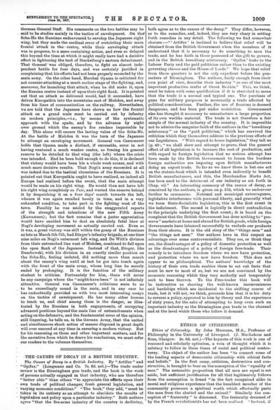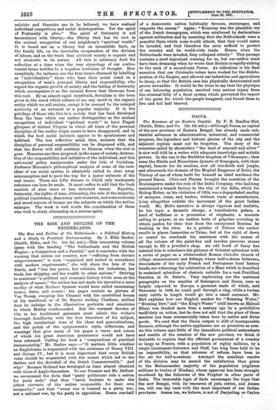ETHICS OF CITIZENSHIP.
Ethics of Citizenship. By John Maccunn, M.A., Professor of Philosophy in the University of Liverpool. (I. MaeLehose and Sons, Glasgow. 2s. 6d. net.)—The keynote of this work is one of reasoned and scholarly optimism, a vein of thought which it is salutary to follow in these times of social and political contro- versy. The object of the author has been " to connect some of the leading aspects of democratic citizenship with ethical facts and beliefs." In the first essay, criticism, destructive and con- structive, is brought to bear on the conception of the "equality of men." The untenable proposition that all men are equal is set aside, but sufficient justification for all that legitimately follows from the assumption is found "in the fact recognised alike in moral and religious experiencelhat the humblest member of the community possesses a spiritual worth which effectually parts the man from the chattel and the animal." Similarly the con- ception of "fraternity" is discussed. The fraternity dreamed of by the French revolutionists has not been realised. "Instead, if satirists and theorists are to be believed, we have realised individual competition and social disintegration. Yet the spirit of Fraternity is alive." The spirit of fraternity is noe inconsistent with liberty,—the liberty that has its root in the mutual recognition of our neighbour's "spiritual worth." It is based not on a theory but on irresistible facts, on the family life, on the inevitable co-operation of the division of labour, and on the truth that civilised society is organic and not atomistic in its nature. AU this is salutnary food for reflection at a time when the very etymology of our contro- versial terms testifies to a hopeless confusion of thought. How completely, for instance, are the true issues obscured by labelling as " individualists " those who balm their social creed on a recognition of man's personal liberty and responsibility, who regard the organic growth of society and the feeling of fraternity which accompanies it as the natural flower that blossoms from this root. By an almost equal ineptitude, Socialism is the term given to the creed which refuses to see any merit in the organic entity which we call society, except it be coerced by the usurped authority of an autocrat or a popular majority. It is the privilege of those who live in a society that has been developed from the base which our author distinguishes as the mutual recognition of individual "spiritual worth" to have Pisgah glimpses of distant Utopias in which all trace of the personal discipline of the earlier origin seems to have disappeared, and in which the best social instincts appear to ho spontaneous and habitual. The less reflective mind, then, assumes that the discipline of personal responsibility can be dispensed with, and that the flower will still continue to blossom when the root is gone. Measures are then proposed, in the name of society, destruc- tive of the responsibility and initiative of the individual, and this anti-social policy masquerades under the title of Socialism. Professor Maccunn's philosophical analysis of some of the root- ideas of our social system is admirably suited to clear away misconception and to pave the way for a juster estimate of the real issues. These are lofty themes to which only inadequate reference can here be made. It must suffice to add that the book consists of nine more or less detached essays. Equality, fraternity, the rights of man, citizenship, the rule of the majority, political consistency, democracy and character, and some economic and moral aspects of luxury are the subjects on which the author enlarges. The work is well worth the consideration of those who wish to study citizenship in a serious spirit.

















































 Previous page
Previous page